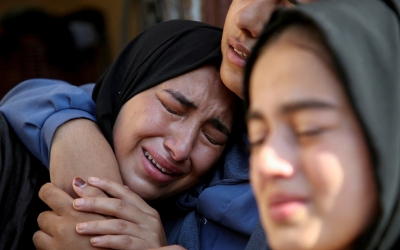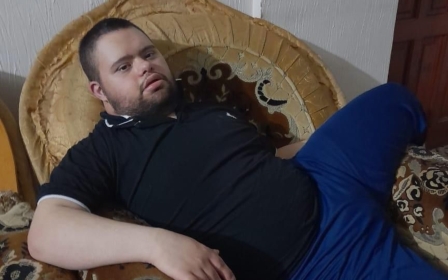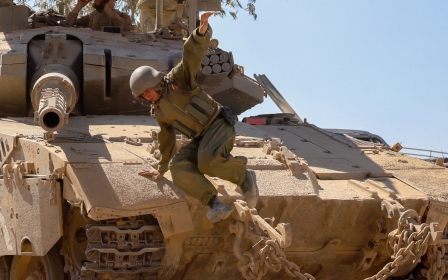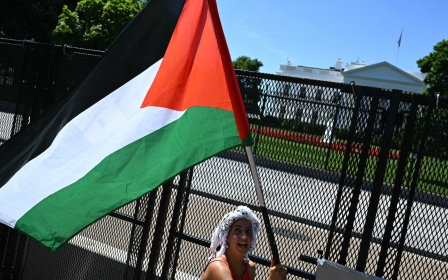A party at an Israeli hotel triggers anger in Morocco
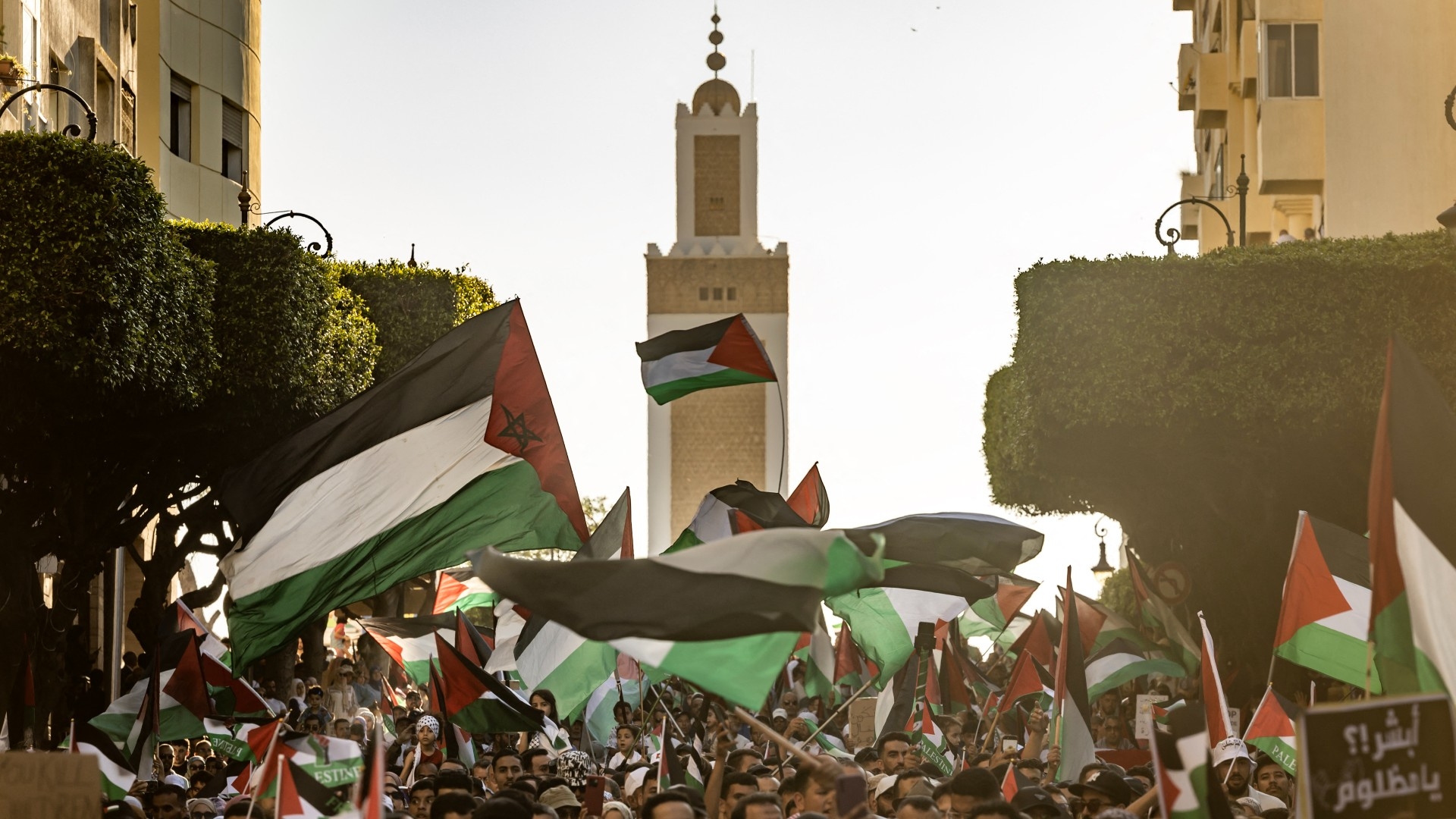
A decision by a group of young Moroccan professionals and influencers to visit Israel has sparked outrage in the North African nation, with anger being directed at Moroccan authorities, including the king, for not recalling the group in protest over the war on Gaza.
Late last week, a group of two dozen young Moroccans visited Israel in an apparent attempt to "foster peace," where they spoke with current and former Israeli diplomats, including Knesset Speaker Amir Ohana, visited historic sites in Jerusalem and the occupied West Bank, and toured areas in southern Israel impacted by the 7 October attacks.
The trip drew little attention from Israelis and Palestinians, but stirred fury in Morocco, where anti-Israel sentiment has been steadily rising due to Israel's nine-month bloody offensive in Gaza.
Several Moroccans, including a source who is in close contact with King Mohammed VI, told Middle East Eye that they were outraged by the delegation's visit coming at a time when calls are growing for an immediate and comprehensive ceasefire.
"The visit should have been called off, and Israeli media shouldn't have advertised it as heavily as they did," the political source told MEE on condition of anonymity as he was not authorised to speak to the media.
New MEE newsletter: Jerusalem Dispatch
Sign up to get the latest insights and analysis on Israel-Palestine, alongside Turkey Unpacked and other MEE newsletters
"The event [took place] at a time when calls are growing, both regionally and internationally, for a ceasefire. This stunt will not help Morocco's image either at home, or regionally," the source added.
Several videos from the delegation's trip went viral on social media, drawing outrage among a growing number of Moroccans who are calling for a reversal of the normalisation process.
'The optics of this trip won't benefit the kingdom as the death toll continues to mount in Gaza'
- Moroccan academic
One of the videos showed the delegation singing and dancing with Israelis at a hotel, whilst another showed the group visiting a food market in Jerusalem, where they could be seen praising Israeli society for its apparent warmth and tolerance.
Israeli news outlets claimed the party was "spontaneous" and "unplanned," but a Morocco-based academic, who requested anonymity due to sensitivities surrounding the topic, said that such videos were clear attempts by Israeli government-backed groups to re-shape the narrative of the two countries's relationship in the face of growing global solidarity for the Palestinian cause.
"The optics of this trip won't benefit the kingdom as the death toll continues to mount in Gaza," the academic, who at one point in his career advised the royal palace, told MEE.
Growing anti-normalisation sentiment
The ripples spreading across the Middle East from the war on Gaza have underscored what many activists and experts have been saying for years, that the Palestinian cause is still a deeply felt rallying cry and Israel's position in the region will remain unstable as long as its conflict with the Palestinians continues.
In recent months, tens of thousands of protesters from across the political spectrum have taken to Morocco's streets to denounce Israel and express support for Palestinian groups, including Hamas.
The protesters have criticised Israel's allies, including the United States, and chanted demands for the government to overturn normalisation and expel Israeli diplomats.
Morocco was one of four Arab nations to establish ties with Israel in 2020, as part of the so-called Abraham Accords, an agreement that brought Rabat political capital in Washington and also led to both the US and Israel recognising Morocco's claim over the disputed Western Sahara.
For decades, Arab nations had insisted that the price of normalisation with Israel was the creation of an independent Palestinian state. But authoritarian leaders from across the region have begun to weigh the negative public opinion of a formal relationship with Israel against the economic and security benefits it could offer.
Whilst Morocco and Israel had liaised for nearly 60 years on military and intelligence matters, the countries' defence ties deepened after the normalisation deal, with the kingdom inking deals to purchase Israel's highly coveted Barak 8 missile defence system, Hermes drones and its spy satellite system, as part of its ongoing war against pro-independence rebels in the Western Sahara region.
But the costs of the normalisation deal, perceived as being done at the expense of Palestinians, have come under renewed criticism as the death toll spirals in Gaza.
A poll published by the Arab Center Washington DC in February found that anti-normalisation sentiment had risen from 67 percent to 78 percent among Moroccans.
Prominent Moroccans, including figures from the Justice and Development Party, who once stood behind the deal, have also said they can no longer support the relationship citing the death toll in Gaza.
The political source told MEE that the youth delegation's visit, and its discussions with Israeli ministers such as Amichai Chikli, had irked many Moroccan politicians currently serving in the country's parliament.
The source didn't disclose which Moroccan legislators were upset, but Chikli, who serves in Prime Minister Benjamin Netanyahu's government as minister of diaspora affairs, has rejected calls for a ceasefire and hasn't ruled out establishing Jewish settlements in post-war Gaza.
Moroccan authorities to blame
Several Israeli news outlets have since reported on the delegation's visit, and in particular heaped praise on the work of the organisers, the Israeli NGO Sharaka.
Founded in the wake of the 2020 normalisation agreements, Sharaka describes itself as aiming to further improve relations between Israel and Muslim countries.
Some of the group's members, who hail from countries including Bahrain, the United Arab Emirates and Morocco, however, have faced renewed criticism for their reluctance to discuss or condemn Israel's 76-year occupation of the Palestinian territories, including the deteriorating political and security situation in occupied East Jerusalem and the West Bank.
On Monday, the Jerusalem Post reported that two members of Moroccan delegation had been shunned by friends and family members due to the anger the visit had elicited back home.
Hassan Bennajeh, an author and activist who has helped spearhead pro-Palestine solidarity protests, took aim at the makhzen, a term Moroccans use to refer to the king and powerful courtiers and security agencies, for the trip and the anger it had stoked at home.
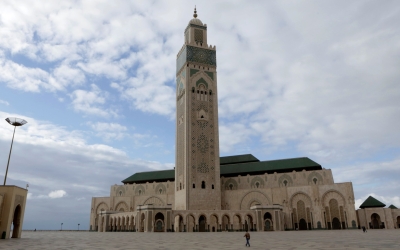
"Such a visit to a fascist, criminal entity equates to participating in its crimes, supporting it, and endorsing its acts of genocide," Bennajeh told MEE.
"The Moroccan authorities bear full responsibility, politically, administratively, and security-wise. This visit underscores the Moroccan authorities' deep involvement in the process of normalisation, directly opposing the views of the Moroccan people, who have expressed their rejection for nine months through sit-ins, marches, statements, boycott campaigns, media campaigns, petitions, and mass gatherings."
Since the war erupted, Moroccan authorities have tried to address public demands by calling for a de-escalation in Gaza, access to humanitarian aid, and the protection of civilians in line with international law.
But the pictures and videos of the bloodshed, of body bags, pancaked buildings and children covered in blood, continue to be widely shared on social media sites and the WhatsApp messaging app.
"The Zionist entity, along with a few Moroccans, is desperately trying to go against the tide by organising visits to Israel and hosting delegations in Morocco," Abdel Samad Fathi, the president of the Moroccan Commission in Support of the Nation's Issues, told MEE.
"Their aim is to expand the scope of popular normalisation and improve the tarnished image of the Zionists, which has been further sullied by the ongoing war in Gaza and all of Palestine.
"We assert that such steps will remain isolated, widely rejected by the populace, and condemned by all pro-Palestinian forces," he added.
Middle East Eye delivers independent and unrivalled coverage and analysis of the Middle East, North Africa and beyond. To learn more about republishing this content and the associated fees, please fill out this form. More about MEE can be found here.


